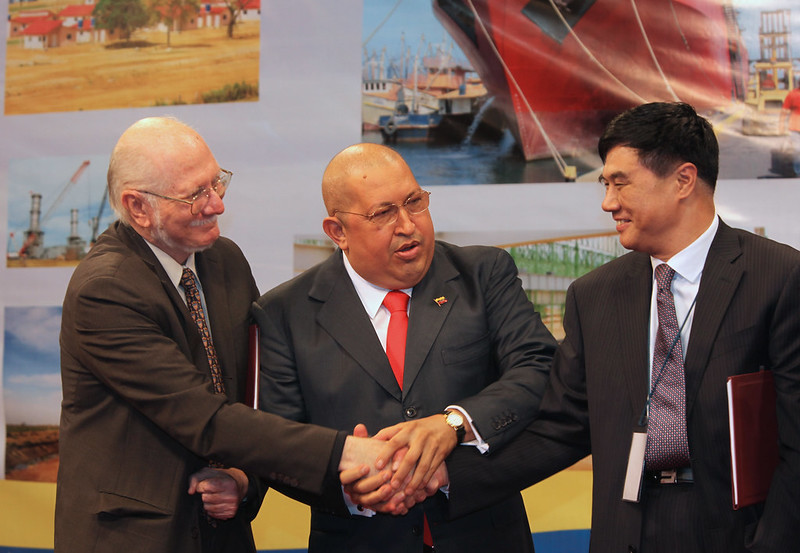
Former President Hugo Chávez receives a Chinese delegation. No Latin American leader traveled more to Beijing than Hugo Chávez during his presidency.
“China is Venezuela’s largest creditor…The restructuring of this enormous amount of money has been one of the headaches in relations between both countries.”
Upcoming elections and increasing pressure at home drove Venezuelan leader Nicolás Maduro to head to China in September 2023 to reignite relations. In the past, China was Venezuela’s greatest benefactor. During the years of President Hugo Chávez (1998-2013), Venezuela received over $60 billion in loans through a combination of sovereign lending, China’s policy banks, and large development projects.[i] However, during Nicolás Maduro’s government (2013-present), Venezuela’s economy fell precipitously through a combination of mismanagement and corruption, causing China to withdraw much of its support in 2015 and 2016. Ever since, Maduro has struggled to return to China’s good graces and convince the Chinese Communist Party that he can be a good steward of Venezuela’s economy. While in China, Spanish daily El País reports Maduro had an agenda aimed at finding solutions to Venezuela’s grave economic crisis and rebuilding robust bilateral ties.
Maduro’s efforts were in vain. As one of Mexico’s main daily newspapers La Jornada states, the two partners signed dozens of agreements, but none of them involved the depth of investment Venezuela received during the Chávez years. Maduro’s trip failed to yield the kind of agreement he needed to reset his economy. The agreements reveal that China no longer sees Venezuela as its principal partner in Latin America to challenge the United States geopolitically. To assuage Maduro, China and Venezuela upgraded their bilateral ties to an “all weather relationship.” While this represents an upgrade in the hierarchy of China’s foreign relations, Maduro’s trip revealed the fundamental distrust that persists in Beijing about its ability to support Caracas monetarily and get a return on its investment.[ii] Lack of Chinese financial support and a presidential election likely upcoming in 2024 suggest Maduro will have to rely on greater repression to hold onto power. Additionally, Maduro’s largely empty-handed return from China may be seen by Russia as an opening to deepen their strategic ties to Venezuala, given Moscow’s desire to use Latin America as a counterpoint to U.S. policy in Europe, and specifically, support for Ukraine.[iii]
Sources:
“Nicolás Maduro visita China para tratar de paliar la crisis económica de Venezuela (Nicolás Maduro visits China to try to alleviate the economic crisis in Venezuela),” El País (Spanish daily with excellent regional coverage of Latin America), 12 September 2023. https://elpais.com/internacional/2023-09-12/nicolas-maduro-visita-china-para-tratar-de-paliar-la-crisis-economica-de-venezuela.html
Maduro arrived with an eminently economic agenda and the intention of finding solutions to the crisis that is shaking the country… The intention is to strengthen ties that have been diluted in recent years and realign interests in an international theater polarized by the tense relationship between the United States and Beijing… China is Venezuela’s largest creditor, the Latin American country that has the largest debt with Beijing: since 2007, it has received about 60 billion dollars in Chinese state loans… The restructuring of this enormous amount of money has been one of the headaches in relations between both countries and was the driver behind Maduro’s last visit to Beijing in 2018.
“Relación China-Venezuela será elevada a su máximo nivel: Xi Jinping (China-Venezuela relationship will be raised to its highest level: Xi Jinping),” La Jornada (one of Mexico’s daily newspapers), 13 September 2023. https://www.jornada.com.mx/notas/2023/09/13/mundo/relacion-china-venezuela-sera-elevada-a-su-maximo-nivel-xi-jinping/ Chinese President Xi Jinping announced this Wednesday in a meeting with his counterpart Nicolás Maduro in Beijing the strengthening of relations with Venezuela, which will be raised to their highest level… “All weather relations” are the highest level of Chinese diplomatic relations. Only a handful of countries (Pakistan, Russia, Belarus) have this status.
Notes:
[i] For more information about China’s role in supporting Hugo Chávez’s government, see: Stephen B. Kaplan and Michael A. Penfold, “China-Venezuela Economic Relations: Hedging Venezuelan Bets with Chinese Characteristics,” Wilson Center for International Scholars. https://www.wilsoncenter.org/publication/china-venezuela-economic-relations-hedging-venezuelan-bets-chinese-characteristics
[ii] For additional analysis on the bind China finds itself in with Venezuela—too important to cut relations, yet too untrustworthy to deepen them—see: “The Future of Sino-Venezuelan Relationship: Make or Break?,” Harvard International Review, December 22, 2021. https://hir.harvard.edu/the-future-of-the-sino-venezuelan-relationship-make-or-break/
[iii] For more information on how Russia views its relations with Latin America as a counterpoint to U.S. policy in Europe, see: Ryan C. Berg, “What Does Russia’s War in Ukraine Mean for Latin America and the Caribbean?,” Center for Strategic and International Studies, March 1, 2022. https://www.csis.org/analysis/what-does-russias-war-ukraine-mean-latin-america-and-caribbean
Image Information:
Image: Former President Hugo Chávez receives a Chinese delegation. No Latin American leader traveled more to Beijing than Hugo Chávez during his presidency.
Source: https ://www.flickr.com/photos/chavezcandanga/6396096677
Attribution: Flickr, CC BY-NC-SA 2.0
